Moola Narayana Swamy
| Moola Narayana Swamy | |
|---|---|
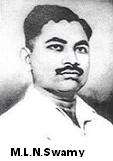 | |
| Born | Tadpatri, Andhra Pradesh, India |
| Died |
20 August 1950 Tadpatri, Andhra Pradesh, India |
| Occupation | Film Producer, Industrialist |
Moola Narayana Swamy was an Indian film producer, known for his works in Telugu cinema, and Tamil cinema. he founded Vauhini Studios which became one of the largest production companies in South Asia at that time. In later years, B.Nagi Reddy acquired Vauhini Studios, and later renamed it to Vijaya Vauhini Studios.[1][2][3][4]
Early life
Moola Narayana Swamy's native was Tadipatri, Anatapur (Dist), Andhra Pradesh, India. Narayana Swamy's father died at a very young age. His father was an Industrialist. After the death of his father, Narayana Swamy took over the Arrack business at a very young age. He started several businesses such as Rayalaseema Bank, Rayalaseema Textiles, Cuddapah Ceramics, Cuddapah Electric Company, Oil mills, Milk Co-op societies, Arrack contracting[1][3]
Narayana Swamy met Bommireddi Narasimha Reddy (father of B.N.Reddy and B.Nagi Reddy) through some business connections. Both of them became business partners and started exporting onions to Rangoon in Burma. Narayana Swamy and B.N.Reddy joined as partners in Rohini Pictures owned by H.M.Reddy. Under Rohini pictures banner they produced some movies like Gruhalakshmi. Later H.M.Reddy and B.N.Reddy had differences and B.N.Reddy and Narayana Swamy separated and decided to start their own production company. With Narayana Swamy as a major share holder Vauhini Pictures was started. Several movies were produced under this banner like Vandemataram, Sumangali, Devatha and Swarga Seema. Swarga Seema movie was shot mainly in Newtone studio in Madras. But there were so many difficulties with the studio and younger B.N.Reddy who was also director for the movie was very upset and expressed this to Narayana Swamy. So Narayana Swamy suggested that they could build a new studio.
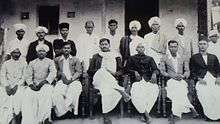
Vauhini Studio was started under the chairmanship of Narayana Swamy. Narayana Swamy was the major share holder. Out of two and half lakh rupees investment, Narayana Swamy's share was two lakhs and rest were B.N.Reddy, Nagi Reddy and others. As part of inheritance from their father Narasimha Reddy, B.N.Reddy and Nagi Reddy got these shares.
In 1948 Narayana Swamy properties and businesses were seized due to income tax problems. Vauhini studio was also leased to Vijaya Productions to save from income tax. Narayana Swamy died in 1950. He was 38 years old at the time of his death. At the time of his death all his sons were minors. His eldest son Moola Venkata Rangaiah was 11 years old. His family went into deep financial trouble.
Narayana Swamy died in 1950. He was 38 years old at the time of his death. At the time of his death all his sons were minors. His eldest son Moola Venkata Rangaiah was 11 years old. His family went into deep financial trouble.
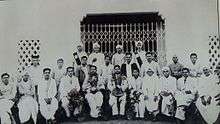
In 1961, after Narayana Swamy's son became major. His eldest son with the help of Damodaram Sanjeevaiah Damodaram Sanjivayya (whom Narayana Swamy helped for his education) sold the studio to B.Nagi Reddy as part of an agreement that they'll clear all the income tax dues that need to be paid by Narayana Swamy family. B.Nagi Reddy later renamed the studio to Vijaya Vauhini Studios.
Personal life
Narayana Swamy built theatres, Vauhini Talkies in his native place Tadipatri and Raghuveer Talkies in Anatapur. Narayana Swamy got his childhood friend K.V.Reddy Kadiri Venakata Reddy as cashier in Vahuini Pictures and later made him direct the movie Bhakta Potana. Bhakta Potana was a very big hit at that time. K.V.Reddy later directed many other movies for Vauhini and Vijaya studios.
Narayana Swamy had 4 sons and 4 daughters. His eldest son Moola Venkata Rangaiah was also Municipal Chairman for Tadipatri for one term.[1][3]

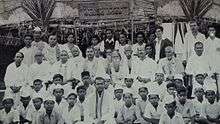
Death
Narayana Swamy died in 1950. His eldest son Moola Venkata Rangaiah was the co-owner of the studios.[1][3]
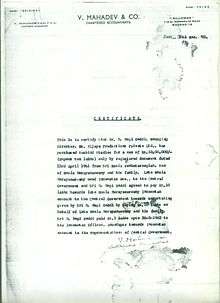
Selected filmography
- Producer
- Vande Mataram (1939)
- Gruhalakshmi (1938)
- Sumangali (1940)
- Devatha (1941)
- Bhakta Potana (1942)
- Pedda Manushulu
- Vaddante Dabbu (1944)
- Swargaseema (1945)
- Yogi Vemana (1947)
- Guna Sundari Katha (1949)
References
- 1 2 3 4 "The story in a road name - CHEN". The Hindu. 2009-12-07. Retrieved 2016-05-30.
- ↑ Narayana Swamy Moola on IMDb
- 1 2 3 4 "Telugu Cinema - Research - "Telugu Cinema - past and the present" by Gudipoodi Srihari". Idlebrain.com. Retrieved 2016-05-30.
- ↑ "Bhatktha Potana (1943) - Anantapur". The Hindu. 2011-12-11. Retrieved 2016-05-30.